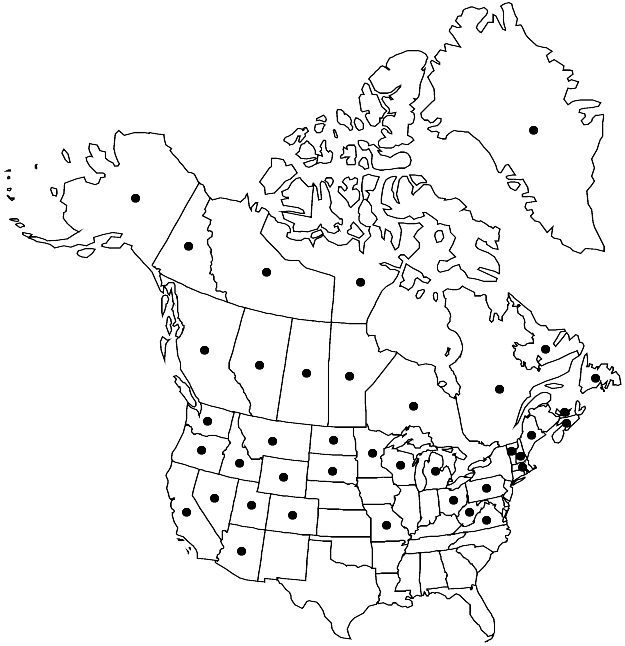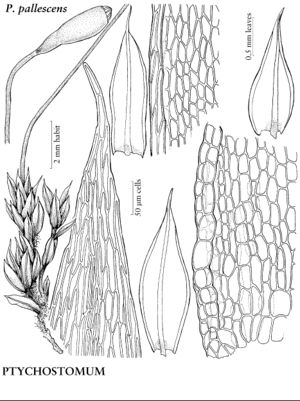Difference between revisions of "Ptychostomum pallescens"
Phytologia 87: 21. 2005.
FNA>Volume Importer |
imported>Volume Importer |
||
| (6 intermediate revisions by 2 users not shown) | |||
| Line 9: | Line 9: | ||
|special_status={{Treatment/ID/Special_status | |special_status={{Treatment/ID/Special_status | ||
|code=F | |code=F | ||
| − | |label= | + | |label=Illustrated |
}} | }} | ||
| − | |basionyms={{Treatment/ID/ | + | |basionyms={{Treatment/ID/Basionym |
|name=Bryum pallescens | |name=Bryum pallescens | ||
|authority=Schleicher ex Schwägrichen | |authority=Schleicher ex Schwägrichen | ||
| + | |rank=species | ||
| + | |publication_title=Sp. Musc. Fond. Suppl. | ||
| + | |publication_place=1(2): 107, plate 75 [right]. 1816 | ||
}} | }} | ||
|synonyms= | |synonyms= | ||
| Line 30: | Line 33: | ||
|elevation=low to high elevations (0-3300 m) | |elevation=low to high elevations (0-3300 m) | ||
|distribution=Greenland;Alta.;B.C.;Man.;Nfld. and Labr.;N.W.T.;N.S.;Nunavut;Ont.;P.E.I.;Que.;Sask.;Yukon;Alaska;Ariz.;Calif.;Colo.;Idaho;Maine;Mass.;Mich.;Minn.;Mo.;Mont.;Nev.;N.H.;N.Dak.;Ohio;Oreg.;Pa.;S.Dak.;Utah;Vt.;Va.;Wash.;W.Va.;Wis.;Wyo.;South America;Eurasia;Pacific Islands (New Zealand). | |distribution=Greenland;Alta.;B.C.;Man.;Nfld. and Labr.;N.W.T.;N.S.;Nunavut;Ont.;P.E.I.;Que.;Sask.;Yukon;Alaska;Ariz.;Calif.;Colo.;Idaho;Maine;Mass.;Mich.;Minn.;Mo.;Mont.;Nev.;N.H.;N.Dak.;Ohio;Oreg.;Pa.;S.Dak.;Utah;Vt.;Va.;Wash.;W.Va.;Wis.;Wyo.;South America;Eurasia;Pacific Islands (New Zealand). | ||
| − | |discussion=<p>Ptychostomum pallescens is a common widespread boreal-temperate species favoring wet soil in wetlands, along streams, and in springs. The costal awns are pigmented. Ptychostomum creberrimum is similar, but has smaller spores, synoicous sexual condition, and ovate segment perforations.</p> | + | |discussion=<p><i>Ptychostomum pallescens</i> is a common widespread boreal-temperate species favoring wet soil in wetlands, along streams, and in springs. The costal awns are pigmented. <i>Ptychostomum creberrimum</i> is similar, but has smaller spores, synoicous sexual condition, and ovate segment perforations.</p> |
|tables= | |tables= | ||
|references= | |references= | ||
| Line 39: | Line 42: | ||
-->{{#Taxon: | -->{{#Taxon: | ||
name=Ptychostomum pallescens | name=Ptychostomum pallescens | ||
| − | |||
|authority=(Schleicher ex Schwagrichen) J. R. Spence | |authority=(Schleicher ex Schwagrichen) J. R. Spence | ||
|rank=species | |rank=species | ||
| Line 53: | Line 55: | ||
|publication title=Phytologia | |publication title=Phytologia | ||
|publication year=2005 | |publication year=2005 | ||
| − | |special status= | + | |special status=Illustrated |
| − | |source xml=https:// | + | |source xml=https://bitbucket.org/aafc-mbb/fna-data-curation/src/2e0870ddd59836b60bcf96646a41e87ea5a5943a/coarse_grained_fna_xml/V28/V28_259.xml |
|genus=Ptychostomum | |genus=Ptychostomum | ||
|subgenus=Ptychostomum subg. Cladodium | |subgenus=Ptychostomum subg. Cladodium | ||
Latest revision as of 21:34, 5 November 2020
Plants in dense or open turfs, green or yellow-green. Stems 1–3(–4) cm, comose, innovations comose or somewhat elongate and evenly foliate; somewhat radiculose. Leaves green, twisted to contorted when dry, ovate-lanceolate, flat to weakly concave, (1–)2–3(–3.5) mm, somewhat enlarged toward stem apex; base weakly decurrent; margins revolute to mid leaf or beyond, limbidium strong, in 2 or 3 rows; apex acuminate; costa long-excurrent, awn ± smooth; proximal laminal cells 3–4:1, same width or sometimes wider than more distal cells; medial and distal cells rhomboidal, 14–22 µm wide, 3–4:1, walls usually thin to firm. Specialized asexual reproduction absent. Sexual condition autoicous. Seta 1–2(–3) cm. Capsule brown, elongate-pyriform, symmetric, 2–4 mm, mouth yellow; operculum conic, apiculate; peristome well developed; exostome teeth yellow basally, hyaline distally, lamellae usually straight mid tooth, pores absent along mid line; endostome not adherent to exostome, basal membrane high, 1/2 exostome height, segments with elongate oval perforations, cilia long, appendiculate to nodose. Spores 18–22 µm, finely papillose, pale brown-yellow or green.
Phenology: Capsules mature May–Aug.
Habitat: Damp to wet soil
Elevation: low to high elevations (0-3300 m)
Distribution

Greenland, Alta., B.C., Man., Nfld. and Labr., N.W.T., N.S., Nunavut, Ont., P.E.I., Que., Sask., Yukon, Alaska, Ariz., Calif., Colo., Idaho, Maine, Mass., Mich., Minn., Mo., Mont., Nev., N.H., N.Dak., Ohio, Oreg., Pa., S.Dak., Utah, Vt., Va., Wash., W.Va., Wis., Wyo., South America, Eurasia, Pacific Islands (New Zealand).
Discussion
Ptychostomum pallescens is a common widespread boreal-temperate species favoring wet soil in wetlands, along streams, and in springs. The costal awns are pigmented. Ptychostomum creberrimum is similar, but has smaller spores, synoicous sexual condition, and ovate segment perforations.
Selected References
None.
